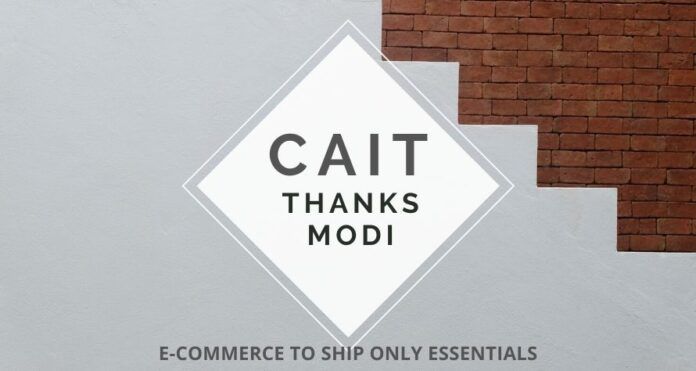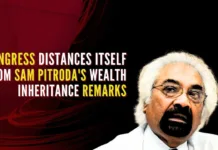
Following the protests from traders’ bodies, the Centre on Sunday directed all States not to allow e-Commerce companies in the sale of non-essential commodities. Though the Union Home Ministry on April 15 circular allowed e-Commerce firms to engage only in the sale of essential commodities from April 20, Maharashtra, Odisha and Rajasthan Governments allowed sale in all commodities.
“In this regard I would like to clarify that while operations of e-Commerce for non-essential goods stands prohibited, however, they will continue to operate for essential goods as has been allowed earlier and continue to be allowed under clause 13(i) of these guidelines, said Home Secretary Ajay Bhalla in a letter to all States, changing provisions on Clause 14(v) which allowed the transport of vehicles related to e-Commerce.
Clause 14(v) gave permission to all vehicles transporting of e-Commerce vehicles, while Clause 13(i) gave only the sale of essential commodities. This loophole in the April 15 MHA guidelines may have been misused by e-Commerce companies, alleged trade bodies. The Confederation of All India Traders (CAIT) petitioned to Prime Minister Narendra Modi, Home Minister Amit Shah and Commerce Minister Piyush Goyal for banning the sale of non-essential commodities by e-Commerce giants like Amazon and Flipkart[1].
They accused e-Commerce giants of manipulating the guidelines and got clearance from Maharashtra, Odisha and Rajasthan Governments. On behalf of the seven crore traders of India, the Confederation of All India Traders today lauded Prime Minister Narendra Modi and Home Minister Amit Shah for the most pragmatic decision of prohibiting E-Commerce Companies to deliver non-essentials amid lockdown period. The CAIT has written a letter thanking the Prime Minister and the Home Minister for valuing the sentiments of Indian traders and protecting their business interests. Notably, since the day of notification, the CAIT was up in arms against the notification and even sought the intervention of Prime Minister Modi and Home Minister Amit Shah beside calling upon Defence Minister Rajnath Singh and Commerce Minister Piyush Goyal.
“The withdrawal of notification indicates that small traders are a priority for Prime Minister Modi and any decision if taken against the traders will not last long and it is the factor which engaged the trading community to run supply chain of essential commodities across the Country successfully even after facing lot many roadblocks and hurdles-said the CAIT,” said CAIT leaders BC Bhartia and Praveen Khandelwal.
“Multinational e-Commerce players have been trying to disrupt the businesses of small Indian traders by adopting unfair business practices such as deep discounting and predatory pricing by controlling inventory. Even in the lockdown period they would have adopted their vitiated business model and promote all kinds of malpractices to damage the foundation of Indian retail. The CAIT has always fought tooth and nail against these companies and has continuously urged the Government to ensure that e-Commerce is done in a fair and ethical environment,” they said.
References:
[1] Traders protest against Maharashtra & Odisha Governments allowing e-Commerce giants Amazon and Flipkart to deliver all goods, while local shops are not – Apr 16, 2020, PGurus.com
- Subramanian Swamy approaches Supreme Court on Govt’s modification of 2G Scam Judgment to avoid auction of Satellite Spectrum - April 23, 2024
- Defence Minister Rajnath Singh visits Siachen. Reviews military preparedness - April 22, 2024
- Amit Shah’s shares in the Stock Market almost doubled in the past five years - April 21, 2024











[…] Clause 14(v) gave permission to all vehicles transporting of e-Commerce vehicles, while Clause 13(i) gave only the sale of essential commodities. This loophole in the April 15 MHA guidelines may have been misused by e-Commerce companies, alleged trade bodies. The Confederation of All India Traders (CAIT) petitioned to Prime Minister Narendra Modi, Home Minister Amit Shah and Commerce Minister Piyush Goyal for banning the sale of non-essential commodities by e-Commerce giants like Amazon and Flipkart[1]. […]
[…] Clause 14(v) gave permission to all vehicles transporting of e-Commerce vehicles, while Clause 13(i) gave only the sale of essential commodities. This loophole in the April 15 MHA guidelines may have been misused by e-Commerce companies, alleged trade bodies. The Confederation of All India Traders (CAIT) petitioned to Prime Minister Narendra Modi, Home Minister Amit Shah and Commerce Minister Piyush Goyal for banning the sale of non-essential commodities by e-Commerce giants like Amazon and Flipkart[1]. […]
[…] खबर को अंग्रेजी में यहाँ […]